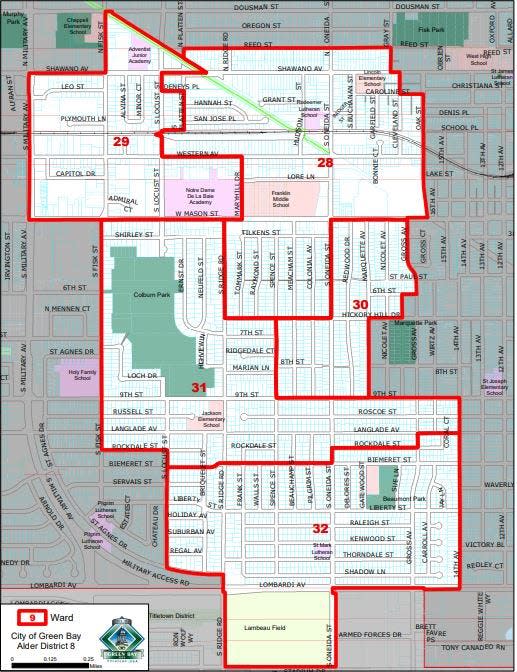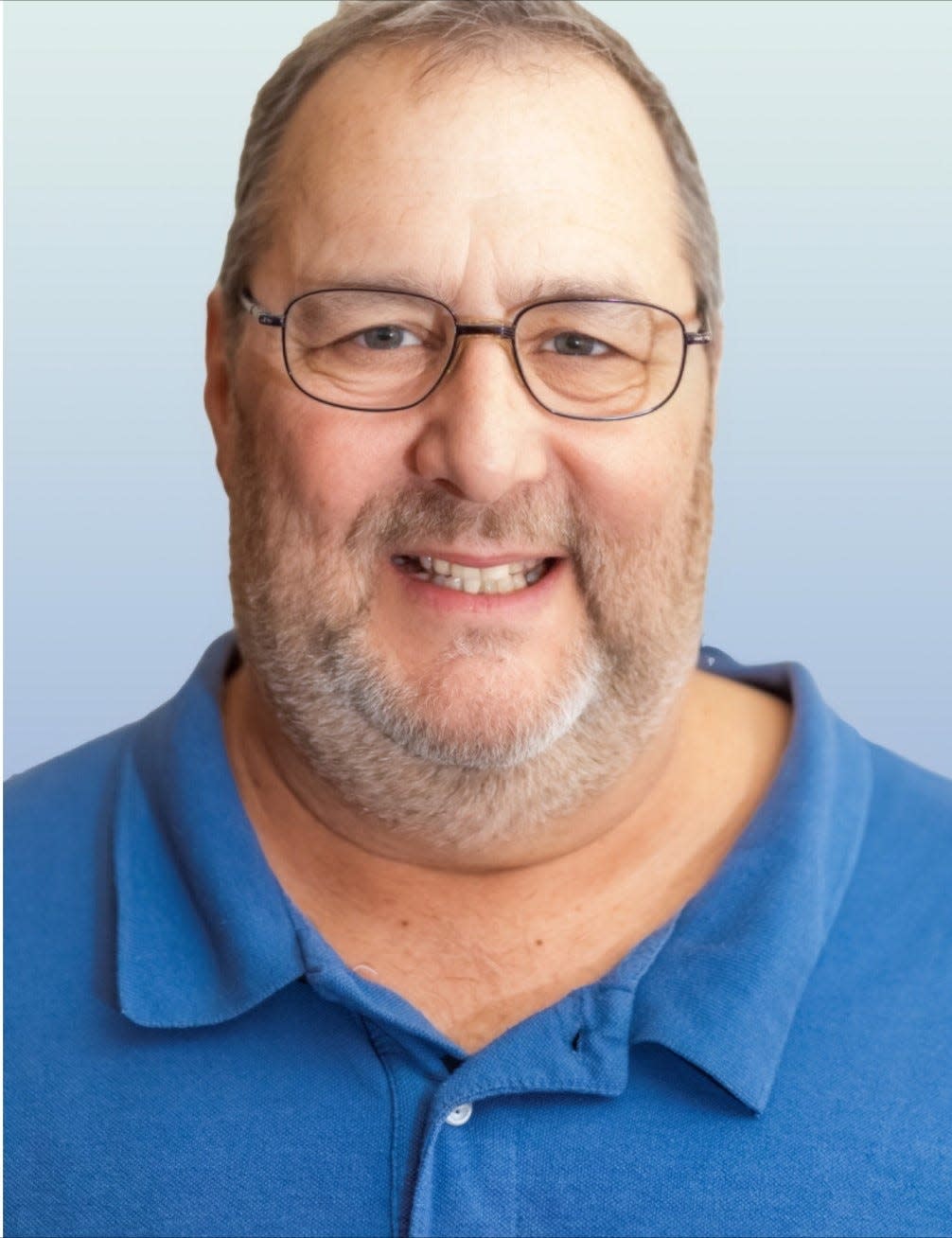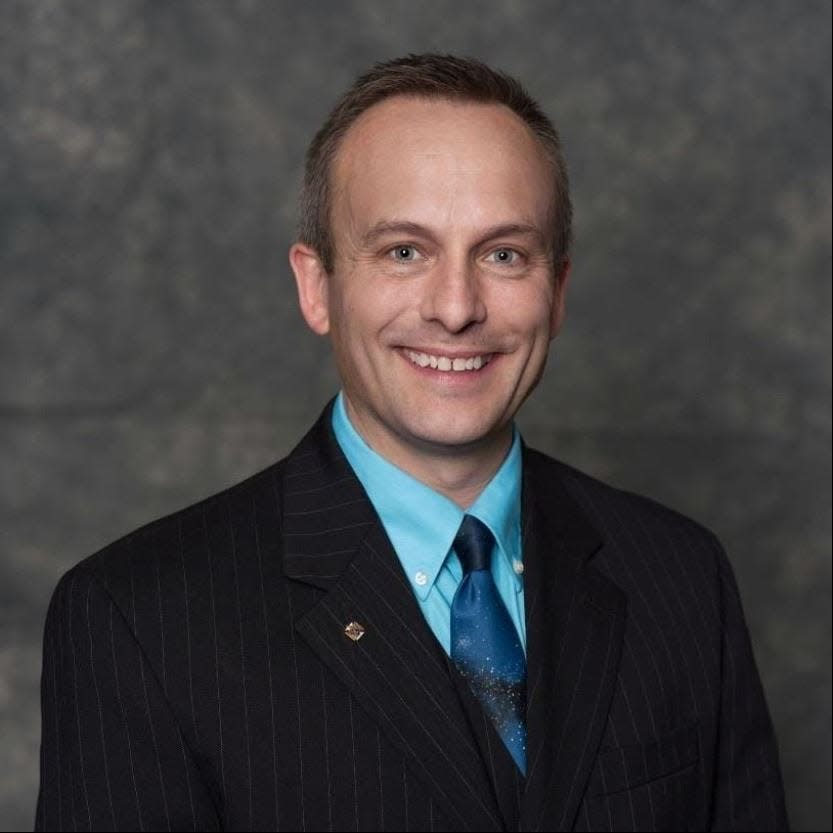Green Bay City Council District 8 election: Ridderbush, Wery focus on development, roads

GREEN BAY - Voters on Green Bay's west side on April 2 will decide whether challenger Jim Ridderbush or longtime incumbent Chris Wery represents the district for the next two years on the Green Bay City Council.
Wery now has the longest tenure on the City Council, having served 20 years between 2002-2012 and from 2013 to the present. Ridderbush is a labor liaison at a Green Bay-area meatpacking plant and the point of contact for the Marquette Park Neighborhood Association who in prior years ran for City Council against longtime council member Guy Zima.
District 8 covers part of the west side from Reed Street to the north, Oak and 14th streets to the east, Lombardi Avenue to the south, and Locust and Fisk streets to the west. It includes parts of the Marquette Park, Colburn Park, Lombardi and Western Corridor neighborhoods.
Ahead of the April 2 election, the Press-Gazette requested each City Council candidate provide some background about themselves and answer several questions issues like funding road construction, spending and housing. Responses were limited to about 200 words. Candidates are listed alphabetically.
For information about registering to vote and polling locations, visit the MyVote Wisconsin website at myvote.wi.gov/en-us.
More Spring 2024 election coverage: As Green Bay City Council candidates raise cash, worries about dark money, attack ads arise

Jim Ridderbush
Age: 62
Occupation: Labor liaison at JBS
Highest level of education: Some college classes at the UW-Madison School for Workers
Campaign website: Friends of Jim Ridderbush
Why are you running? I love my city and want it to be a safe, welcoming place for all. As a neighborhood association leader, United Way and Labor Council board member, and Economic Development Authority member, I understand our community’s wants and needs and will bring that unique perspective to City Council. After 20 years, District 8 needs and deserves an alder focused on the future of our city and the success of our residents. I will treat every constituent with honesty and respect and be a strong voice for all.
What two issues most need to be addressed in Green Bay: My two areas of focus would be safe, affordable housing and strong business development.

Christopher Wery
Age: 54
Occupation: Customer service & fulfillment specialist
Highest level of education: Bachelor's degrees in human development and history from UW-Green Bay
Campaign website: Alderman Chris Wery, District 8 City of Green Bay
Why are you running? I have served District 8 as alderman for 20 years and pride myself on communication with residents and excellent customer service. I am a proven independent on our city council and refuse to bow down to any outside interest or be a rubber stamp for any mayor. I use common sense and always do my homework on issues we handle. I am not someone who gets elected and is never seen or heard from. I am not afraid to speak up or speak out.
What two issues most need to be addressed in Green Bay: The city needs to grow its commercial and industrial sector. Good employers and increased tax base are what we need. We must keep our tax rate under control during these high inflation times. I have been a determined advocate for fixing more roads each year. We are doing better, however have so much farther to go. I will continue to press for more road repair and better ways to achieve this.
Green Bay is currently studying the feasibility of a transportation utility to fund road construction costs like water or sewer service. Why do you support or oppose this idea to replace the wheel tax?
Ridderbush: When it comes to covering the cost of repairing and maintaining our roads and transportation infrastructure, I support replacing the wheel tax with a more equitable approach. I think most people don’t mind paying their taxes, but they also want everyone else to pay their fair share. So if you are a business that puts more strain on our infrastructure, it only seems fair that you pay more than the average citizen. It’s possible that this model could also generate enough extra revenue to pay for more road repair and other improvements, which would be a bonus. This would be a big change so I support the council’s approval of funds to study the options. If I am elected, I would want to know the outcome of that study and hear from my constituents before taking my final vote.
Wery: The city council has asked for a more detailed study in order to ascertain the legality and effectiveness of this type of fund. That study will not be ready until later this year. The only way I would support this in the future is if the wheel tax ended and we lower our tax rate to offset any increases. This cannot be another tax or fee over and above what we are already paying.
How can Green Bay better address residents' need for affordable housing and the general shortage of housing units?
Ridderbush: Our lack of safe, affordable housing is a human and an economic issue. It is a human issue because we have individuals and families who are working hard to build a good life but still can’t find or afford housing. We also have folks struggling on the edges of our community and, without safe, affordable housing, they fall through the cracks. It is an economic issue because the future of our city depends on attracting new residents and businesses, but we can’t do that if we don’t have housing. To address this, I would look at options like subsidies, incentives and public/private partnerships on the local, state and federal levels. The shortage is a national issue so we should also look at what other cities are doing to successfully address the issue and be open to new and creative ideas.
Wery: We need to keep our tax rate in check so that we are an attractive place to build and more affordable to buy a home and then be able to afford the taxes. We should evaluate how to be better partners with builders and developers so that unnecessary roadblocks are removed. We must promote and welcome new ideas and creative solutions and not be stuck in our old ways. We have a few projects under construction right now that will create options. A vibrant, healthy city is one where all of its citizens have access to good housing.
Almost any significant budget cut will involve personnel cuts, which impacts city services. If you want to cut property taxes, what services should be cut to do so?
Ridderbush: The truth is that we all want great public services (police, fire, snowplowing, garbage pickup, parks and recreation, etc.) but we don’t necessarily want to pay for those services. As the cost of everything rises, that isn’t realistic and it isn’t fiscally responsible. If we starve our city of funding now, it will come back to bite us down the road. If I am elected, I can’t promise to cut taxes but I can promise to be smart about how I spend taxpayer dollars. I think we can be responsible and strategic in the way we invest those dollars so that we are maintaining quality services, looking out for public safety, fairly compensating our city workers, and investing in equipment and infrastructure in a way that will actually save us money down the road.
Wery: I disagree with the very assumption and question that is being posed. I have always maintained we should grow our tax base and this will in turn allow us to keep all our core services intact, compensate our great employees fairly and allow us to avoid any large tax increases. I will not artificially target one of our services when there is no current need to do so. Can we continue to streamline and be more efficient in the way we do things? Certainly. As protectors of taxpayer dollars, we must always be on the lookout for smarter ways to do things, but not at the expense of our core services.
Green Bay's recent population growth has been driven by our Hispanic, Black, Native American, biracial and Asian communities. Yet recent Wello surveys show nearly one-third of residents feel like Green Bay does not accept people with different ideas. How can the Green Bay City Council help increase acceptance and well-being as we grow?
Ridderbush: We can help increase acceptance and well-being in our BIPOC communities by getting them involved in our city, our schools and our government. Meet them where they are at, encourage them to participate, provide them with the tools to do it and support them when they do. I work in a plant with a workforce that represents 14 countries and speaks 17 languages. Sometimes it is challenging, but we figure it out. We can figure it out in our community, too. What I know is that these folks are no different than me. They are hardworking and smart. They love their families and want what is best for them, They love our community and they want it to be the best it can be. Everyone deserves a seat at the table and it is the job of those of us already at the table to make room for others.
Wery: It starts and ends with The Golden Rule. Treat others as you would want to be treated. I help anyone in my district who needs it and do not divide people into categories as so many are eager to do. We are all fellow humans here on earth struggling to survive. I would rather unite us than divide us and that is how I interact with all residents.
Contact Jeff Bollier at (920) 431-8387 or jbollier@gannett.com. Follow him on Twitter at @JeffBollier.
This article originally appeared on Green Bay Press-Gazette: Green Bay City Council District 8 election: Wery faces Ridderbush
